My visit to Lebanon, Illinois in early February could only be described as a series of very fortunate events. Back in late November when I was in Boston, I had done an interview on NPR, the US national public radio, talking about my travels around the country and the Lebanons project. A few weeks later, I was contacted by another NPR station in St. Louis, Illinois. The United States being as big a country as it is, each metropolitan area has its own radio station, running local news in addition to some country-wide programs. The interview in Boston had run nationally.
The producer from St. Louis, Alex Heuer, was interested in doing a second interview because he was contacted by a man from nearby Lebanon, Illinois, saying the city had a genuine ‘cedar of Lebanon’. As if out of a time gone by, this man from Illinois hadn’t emailed the station or phoned them; he took to his typewriter instead and wrote them a letter, including a self-addressed stamped envelope (SASE ). Alex sent me a picture of the letter sent by Mr. Harrison Church and it read:
“Listening today to your station, I caught part of an interview with what I take to be a native Lebanese, Fahdi Buckharin [sic. But an impressive sic nonetheless], if I got it down correctly, about his visits to the various Lebanons of this country, and including commentary about Cedars of Lebanon. I wonder if you can put me in touch with him, as we believe we have genuine Cedars of Lebanon here in our Lebanon.”

Initially I thought that there must have been a misunderstanding. When the 7 mayors from American towns called Lebanon visited Beirut in March 1955 and came back with a cedar sapling gift from First Lady Zalfa Chamoun, the Lebanon of Illinois wasn’t one of the seven. But then again, when I was in Lebanon, South Dakota I found out that they had a supposed cedar from the 1955 trip, which turned out to be a juniper, and their mayor hadn’t visited Beirut either. So perhaps their case was similar to Illinois’.
Fast forward two months to February when I finally made my way to Illinois. I called Harry Church and he was very excited to hear from me. He said he had documents to share and asked if I could have brunch with him and his wife Harriet the next day. His voice was that of a somewhat older man, and he was quite the wisecracking fellow. He mentioned he’d be wearing a fisherman’s hat at the restaurant so I could recognize him, and I said it’d be easy for him to recognize me since I would just look Middle Eastern. He quipped: “You mean you’re going to be wearing a turban? I’m kidding; I know you guys don’t do that.”
The following day, I met the Churches at the restaurant and, as I had suspected, Harry looked to be in his late 70s and his wife Harriet in her early 60s maybe. They regaled me with stories about their city, and I found out that he was the city historian and, until a few years ago, had owned the local newspaper, the “ Lebanon Advertiser” for more than four decades. He took out an old yellowed copy from the paper, dated March 30th. On the front page was a portrait of “Assad Moukaddem” and the headline read “Lebanon Plants Cedar: Assad Moukaddem is Honored Guest.”

Lebanon Advertiser – March 30, 1967
Mr. Moukaddem was representing Ambassador Ibrahim El-Ahdab at the ceremony for the planting of the Cedar of Lebanon on Saturday, April 1st. He was a Tripoli native, a journalist and a writer, and once held the position of the director of the Lebanese newspaper “Al-Yom”. In addition, he was a member of the Lebanon delegation to the UN, and the Tourist and Information Counselor at the Embassy of Lebanon in Washington DC.
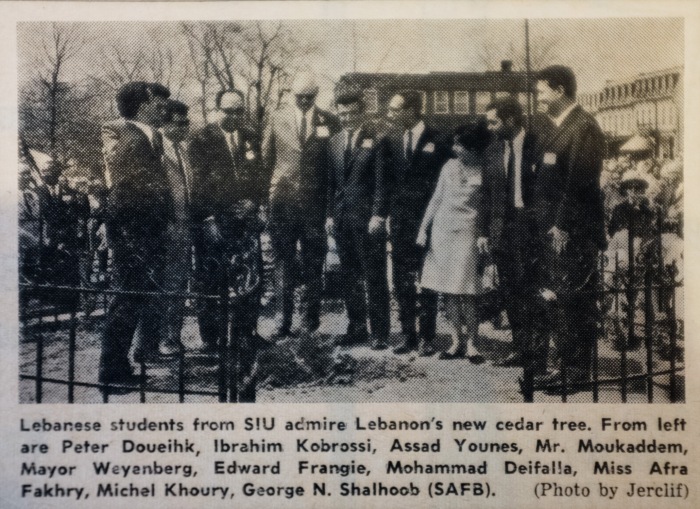
Photograph from the ‘Lebanon Advertiser’ on the day the cedar tree was planted.

Another photo from the ‘Lebanon Advertiser’ showing Mr. Moukaddem planting the cedar tree.
Now the story started becoming clearer. Lebanon, Illinois did have a true cedar, but theirs was different from the one offered to the 7 mayors in 1955. That day in 1967 was of such importance to the city that April 1st was declared “Cedar of Lebanon” day. It was even included in their history booklet. Seven years later, when it was the city’s centennial anniversary, they borrowed the cedar from the Lebanese flag as is, and adopted it as their own.

Lebanon, Illinois’ history booklet. Below is the paragraph in it announcing April 1st as Cedar of Lebanon day.
- Lebanon, Illinois doily showing the Cedar of Lebanon that was adapted as the city’s emblem for their centennial.
- Lebanese Flag
Before parting with Mr. and Mrs. Church, he also gave me a possible clue as to why the other cedars from the 1955 trip might not exist today. Back when the ceremony for the tree planting was being prepared in Lebanon, Illinois, the trees that were brought from our Lebanon had to be quarantined and fumigated. Unfortunately, none of them survived the fumigation. Therefore new saplings had to be brought in from Harvard University’s arboretum; they had been growing true cedars there since 1915. So it is very likely that the saplings that came from Beirut in 1955 did not survive the fumigation as well.
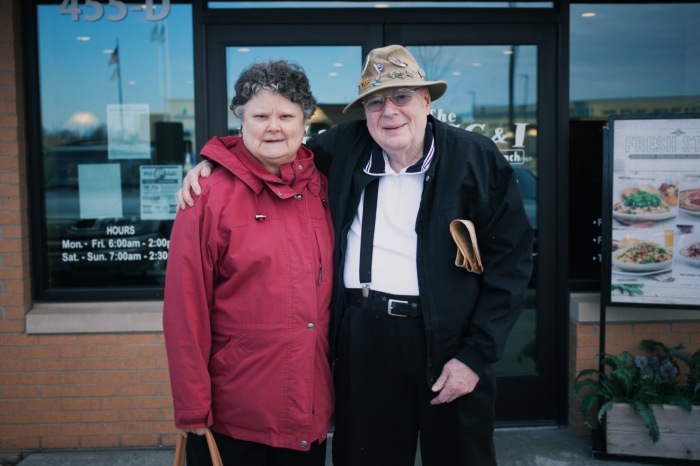
Harriet and Harry Church
My meeting with Mr. and Mrs. Church came on the second day of the visit to Lebanon, Illinois. The first day was even more eventful. I had contacted Alex, the producer of “St. Louis on the Air”, and he met me in the city to conduct the radio interview. He had called Rich Wilkin, the mayor of Lebanon, to ask him if he knew about the cedar tree and he very much did. It was right across from his office, now standing high 50 years after it was planted, fenced, and marked with a plaque below it to commemorate the occasion.
The plaque read: “April 1, 1967. Cedar of Lebanon (Cedrus Libani). Planted by the Lebanon beautification committee and dedicated by Assad Moukaddem representing the embassy of Lebanon as a project in international goodwill and understanding between the country of Lebanon and our city of Lebanon.”
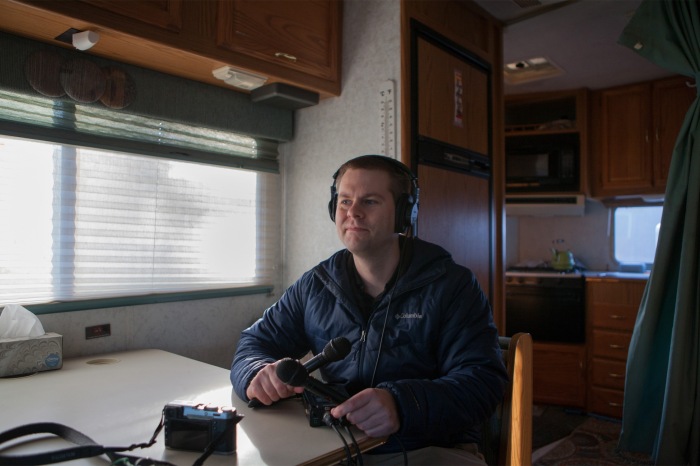
Alex Heuer interviewing me in my RV

Lebanon, Illinois’ cedar, 50 years after it was planted.
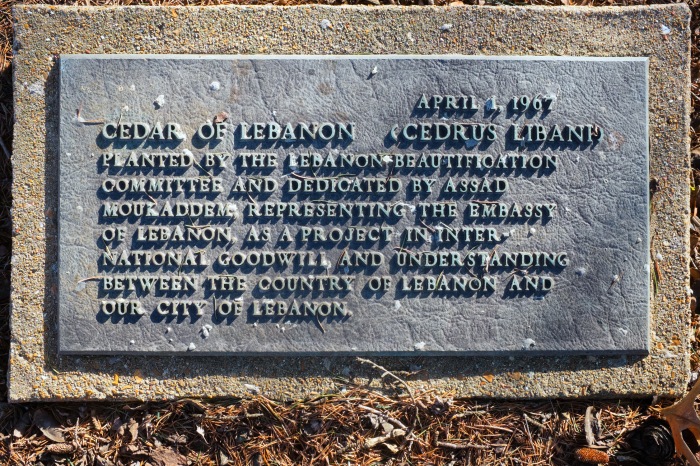
Commemorative plaque below the tree.
After checking the tree, we went to the mayor’s office. He greeted me with unbridled enthusiasm. We talked about the city and its history and my trip so far. He then smiled at me and said: “I have something for you. As a gesture to recognize your goodwill tour, I want to give you the key to the city.”
I must have been speechless for a good minute. It was beyond an honor to me. I thanked Mayor Wilkin profusely while still incredulous that I was being given such a gift. A photographer from the newspaper was there and the photo with me and the mayor, which was published on the paper’s front page the next day, shows how beside myself I was. Had I known before, I would have at least dressed more adequately. But it wasn’t just that. Five months prior when I traveled to the United States, I had given up my apartment and its keys. In March I was going to return the RV and its keys. On that day, the only key I actually owned was the one to the city of Lebanon, Illinois. It certainly didn’t open any physical doors, but I was definitely hoping it would open other doors for me. Dare I hope that I would some day try to do what Mr. Moukaddem did in 1967 around the country? It may be far fetched, but I will sure be trying.

Mayor Rich Wilkin presenting me with the key.

The key to the city of Lebanon, Illinois
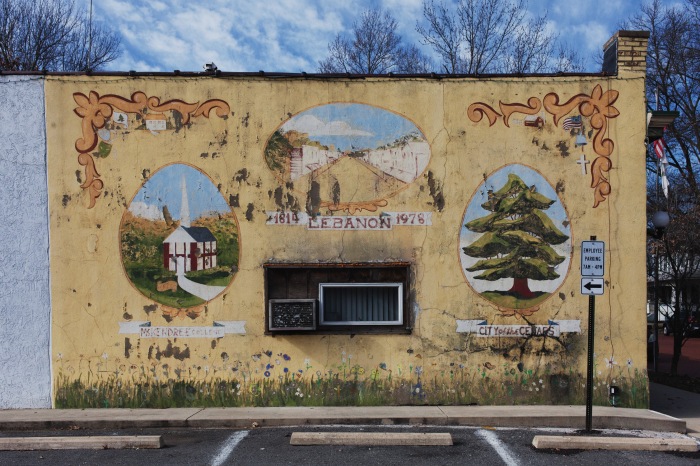
Lebanon, Illinois mural
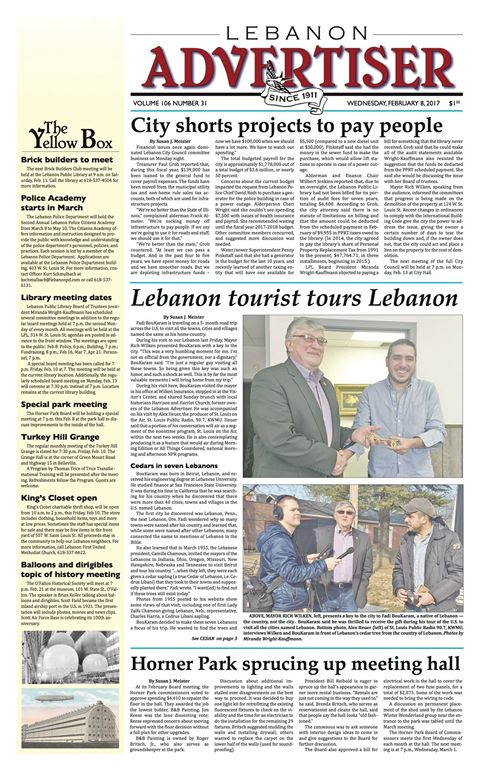
Lebanon Advertiser front page on the following day of my visit.





That’s wonderful! Your trip shows how people can be, bringing to light the best in all of us.
LikeLiked by 1 person
Thank you for sharing your experiences while traveling in the US. I’ve enjoyed your posts so much.
LikeLiked by 1 person
I’m from near Lebanon, Ill. I was waiting to see what you have to say. You absolutely captured the local feeling and attitudes perfectly. Thank you for your blog. Ps. Our town here in Germany also has a grocery store that caters to our large Lebanese population, and flies the flag with cedar daily. Just in case you want to continue on to Europe some time.
LikeLiked by 1 person
Thanks for that! (Hopefully one day I’ll do a European tour)
LikeLike
Truly an interesting post to come across. Great read, thanks for sharing 🙂
LikeLike
Hello, I am from Lebanon, Ohio! I was googling my Lebanon, OH and it took me to Lebanon, PA. I thought it was odd there were two Lebanons in the USA so I came across your article, who knew there were OVER 40?! I continued reading the article and wondered if you ever made it to Lebanon, Ohio. I found that you did, and had fun reading about what you found out in Lebanon, OH. I ended up reading all of your blogs, they were so interesting! I just wanted to say thank you for doing all of this!!
LikeLike
Thank you very much, Abby! Glad you found this interesting. It sure was for me.
LikeLike
Dear Fadi:
I am the Mayor of the City of Lebanon in Pennsylvania. If you are interested, I could provide you with information about our City and when you are able to visit, we would welcome you to our city!
Best wishes,
Sherry Capello
Mayor
LikeLike
Dear Mayor Capello:
I’m sorry for the delayed and thank you very much for your message. I have visited Lebanon, PA twice so far, once in 2016 (that’s where I spent Christmas), and in Fall 2018 (where I photographed the civil war reenactments). I had a great time there! And I found 2 cedar trees (cedrus libani / cedar of lebanon) in Union Canal Park too.
Best,
Fadi
LikeLike
Pingback: Real Lebanons, Fake Cedars. – 1on1
This is a delightful story and a great thing to find after listening to the Kerning Cultures/Radiolab episode (“Lebanon, USA.”)
I live (and grew up) about an hour and a half north of Lebanon, IL, but I don’t see it often because it was bypassed by an interstate highway before I was born. Before this story, the last thing I remembered about Lebanon was a sad story a lot like some of the other Lebanon stories told in Lebanon, USA: the town was shrinking, and its proudest asset, McKendree College, had been forced to close its doors. It was a pretty grim reminder. Then I ran a quick Google search to see what year it had shut down.
And that’s how I found out that I’ve been remembering the story all along. McKendree College, the oldest college in the state of Illinois, originally called “Lebanon Seminary” almost forty years before there was a town called Lebanon there, has not shut down. It became McKendree University over a decade ago, and it’s apparently thriving as much as a small university in a small town can be in 2020!
(Unfortunately, the story I remembered was sort of true–it’s just that it was MacMurray College, in Jacksonville, IL, that had to close its doors. McKendree, like my alma mater and a lot of others, rushed through transfers and financial aid for MacMurray students.)
LikeLiked by 1 person
Thank you, Don. I must’ve missed visiting McKendree when I was in Illinois. It’s good to know the university is thriving (despite the unfortunate consequences of the interstate.)
LikeLike
What were the other Lebanon’s? I’ve been researching but cant find anything
LikeLike
You mean all 40 something of them?
LikeLike
Great story and love to the effort Fadi to connect our countries
LikeLike
This is awesome! I’ve grown up driving across the country and today driving home from Florida I decided to look up why so many Lebanons in America and came across your blog. I’m am a lover of documentary photography, so loved finding this. Already checked out you Insta page…love your work.
LikeLike